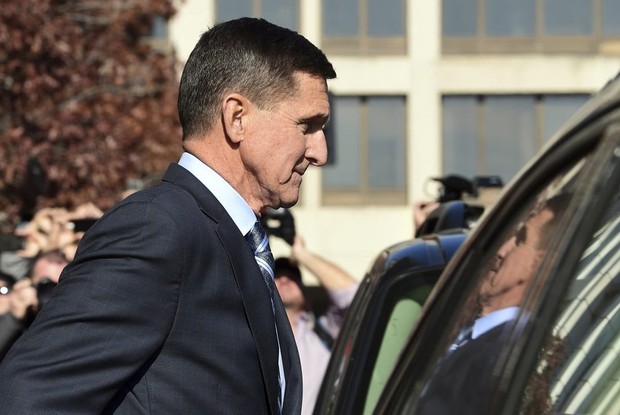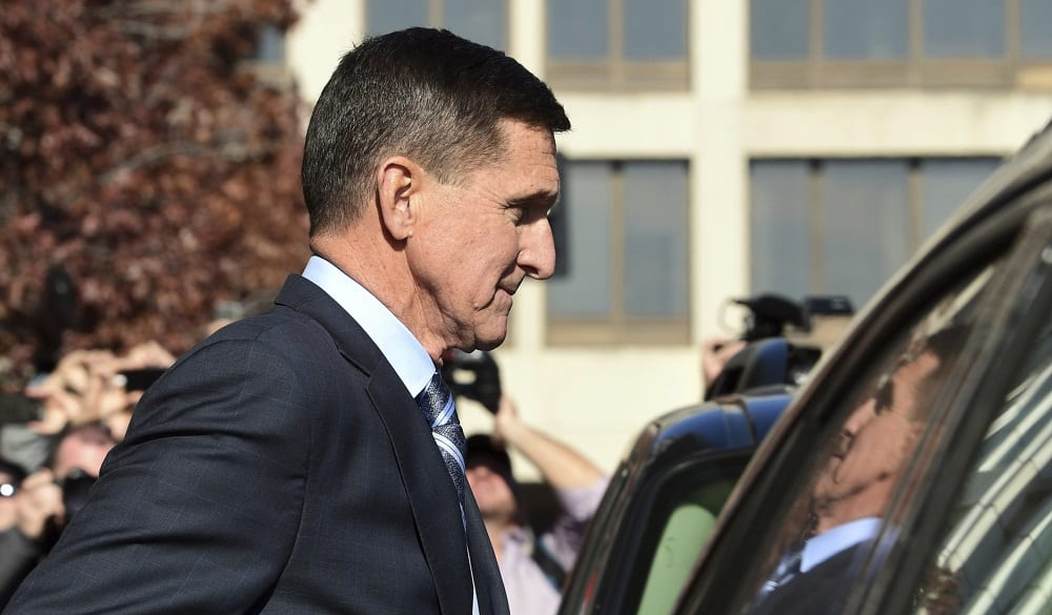
Former Trump national security adviser Michael Flynn leaves federal court in Washington, Friday, Dec. 1, 2017. Flynn pleaded guilty Friday to making false statements to the FBI, the first Trump White House official to make a guilty plea so far in a wide-ranging investigation led by special counsel Robert Mueller. (AP Photo/Susan Walsh)
The Mueller report is turning out to be as truthful as the Steele dossier.
A DOJ court filing shows that the FBI actually began spying on Michael Flynn in January 2016 rather than December 2016 as the FBI and the Mueller report maintain.
Thursday’s filing shows that Flynn had contact with Russian ambassador Sergey Kislyak in both December 2015 and January 2016. Within days of Flynn’s January phone call to Kislyak, the spying began.
During Flynn’s January 24, 2017 FBI interview, he told agents Peter Strzok and Joe Pientka about these contacts. Although a redacted copy of the 302 report was released last December, Flynn’s remarks about his early contacts with Kislyak only appear on the unredacted 302 which was included in Thursday’s DOJ court filing. (The 302 can be viewed here.)
Now we know why this information was redacted.
Flynn told Strzok and Pientka that he had “met with Kislyak at the Russian Ambassador’s residence next to the University Club prior to traveling to Russia in December 2015.” This visit is described in the 302 as a “courtesy call.” Flynn was scheduled to speak in Moscow at a Russia Today (RT) event about Middle East issues for which he was paid $45,000. He sat next to Putin at the dinner. The 302 indicated that “Flynn received an appropriate “threat briefing” from U.S. officials before attending.”
Flynn told the agents that he called Kislyak in January 2016 upon hearing of the death of “former GRU Director Igor Sergun’s death in Lebanon…to express his condolences” and note that Sergun was “someone the U.S. could work with.” Sergun died Jan. 3, 2016.”
Fox News’ Gregg Re reports that several days after Flynn’s phone call to Kislyak, it became known that Flynn was informally advising the Trump campaign. FBI informant Stefan Halper “sprang into action” to spy on him. (Halper also contacted other members of Trump’s campaign including Carter Page, George Papadopoulos and Sam Clovis several months later which was disclosed in May 2018.)
Halper contacted Russian academic and writer Svetlana Lokhova, who resides in London, to glean some information about Flynn.
In addition, Lokhova received a dinner party invitation from Christopher Andrew. He was a Cambridge professor and the official historian for MI5, the British domestic intelligence service, with whom she had co-written a book. The other invited guests were to be Halper and his wife. Lokhova was given a choice of two dates the next month.
Lokhova told Fox News, “It was very, very unusual because Stefan Halper and I, despite being part of the same group, and meeting pretty much in a public forum, we’ve had no personal contact at all. [Halper] to me was an obnoxious academic who absolutely hated all Russians.”
Lokhova filed a lawsuit last month against Halper, The Wall Street Journal, The Washington Post and MSNBC. According to Fox News:
Lokhova accused Halper and various news media outlets of conspiring to defame her, by falsely claiming she had inappropriate contact with Flynn to further the narrative that Flynn was compromised by Russia.
The complaint asserted that “Stefan Halper is a ratf—– and a spy, who embroiled an innocent woman in a conspiracy to undo the 2016 Presidential election and topple the President of the United States of America.”
According to the lawsuit, “On January 12, 2016, [Cambridge Professor Christopher] Andrew emailed Lokhova, and invited her and her partner, David North (‘North’), to Andrew’s house to have dinner with Halper and his wife. Two dates in February were offered. Andrew stated that the purpose of the dinner was to discuss the book that Lokhova and he were authoring. Lokhova was perplexed. At no point before this unexpected invitation had Halper expressed any interest in Lokhova’s work.”
“Halper had no interest in Lokhova’s work. Rather, Halper wanted to have dinner with Lokhova to probe her for information relating to Flynn in the hopes that his FBI handlers might find a basis upon which to file an application to conduct surveillance and spy on General Flynn.”
Up until now, it was thought that Flynn’s calls to Kislyak during the transition period in December 2016 had been the start of the FBI’s interest in Flynn. But this new information shows that it actually began in January 2016.
The Mueller report does not mention the spying activity which occurred earlier in 2016. Instead, they maintain that the FBI’s interest in Flynn began when his phone calls with Kislyak during the transition (December 2016) were discovered.
No surprise. We’ve heard of three other instances where the Mueller report has omitted inconvenient information in the last week already. This is number four. Yes, I am counting.
According to Mueller’s report:
Members of the intelligence community were surprised by Russia’s decision not to retaliate in response to the sanctions. When analyzing Russia’s response, they became aware of Flynn’s discussion of sanctions with Kislyak. Previously, the FBI had opened an investigation of Flynn based on his relationship with the Russian government. Flynn’s contacts with Kislyak became a key component of that investigation.
When can we call out Mueller and his team of angry Democrats for their lies?
The more the Mueller report is scrutinized, the more discrepancies are found.
The other item that was learned from Thursday’s court filing is that Kislyak asked Flynn “to set up a videoconference between the president-elect and Russian President Vladimir Putin on Jan. 21, 2017, they day after Trump’s inauguration.”













Join the conversation as a VIP Member